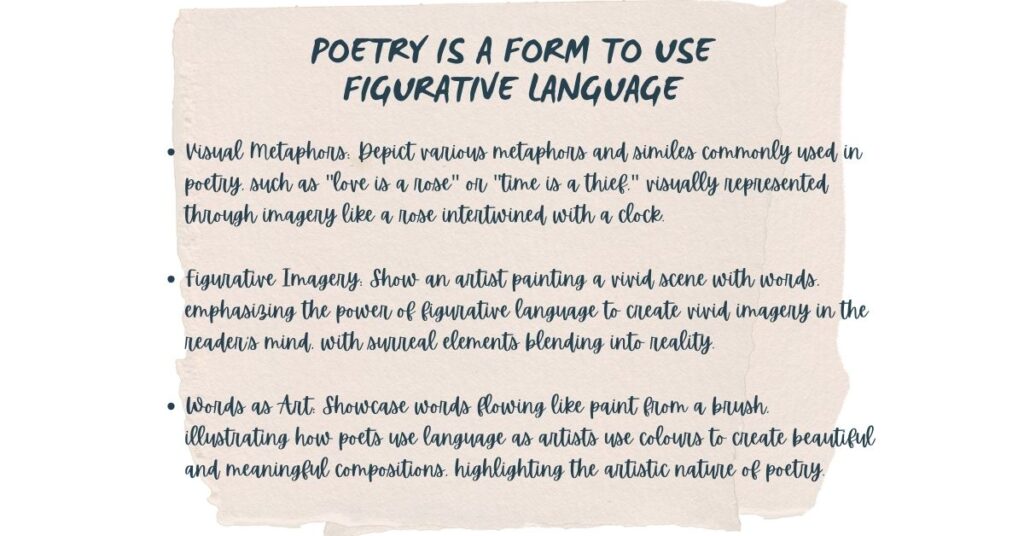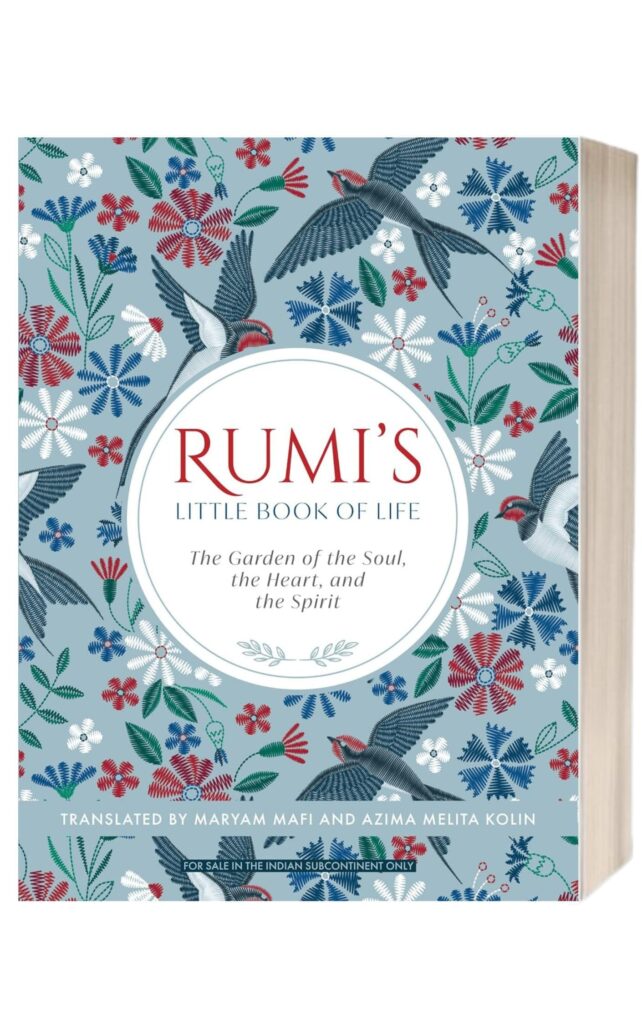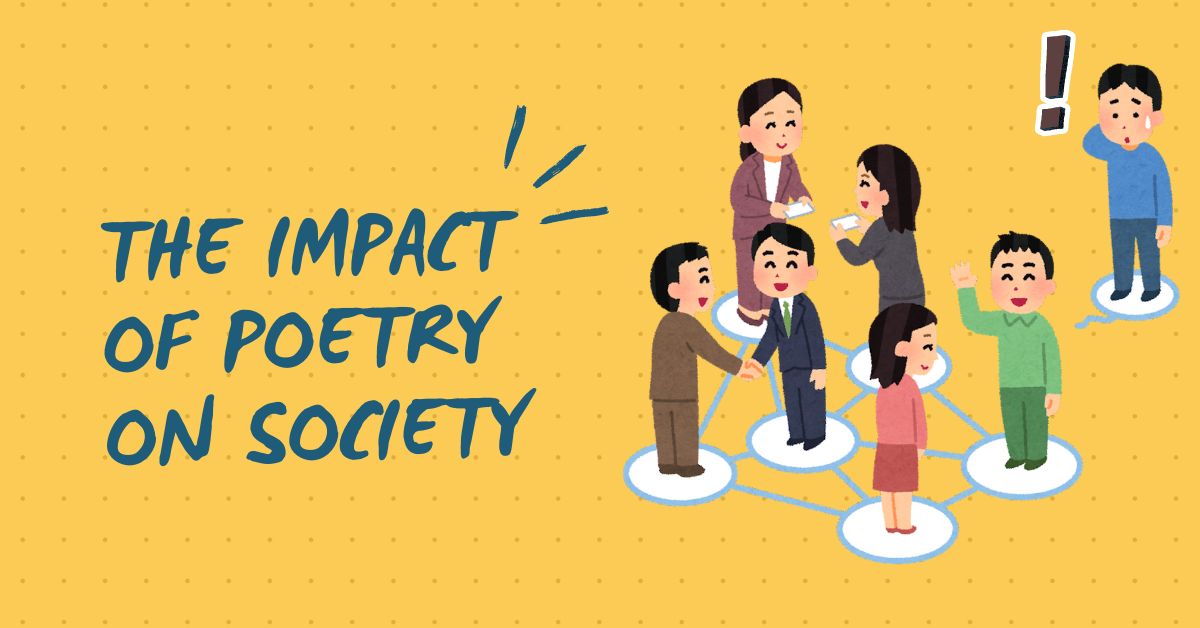Poetry has had a profound impact on society throughout history. They function as a powerful means of expression, communication, and cultural preservation. Here are a few ways that poetry has shaped and influenced humanity.
Poetry is a form of literary expression that uses figurative language, imagery, and rhyme to convey emotions, ideas, and experiences. It is one of the oldest and most enduring forms of human expression, dating back to ancient civilizations.
One of the most striking features of poetry is its use of figurative language. Poetry allows the poet to convey complex ideas and emotions through metaphor, simile, and other literary devices. Its figurative language creates a sense of imagery. Poetry allows the reader to visualize the scenes and experiences.
Poetry is a Form to Use Figurative Language
Another meaningful aspect of poetry is its use of rhyme and meter. Rhyme is the repetition of sounds at the end of words. The meter is the pattern of stressed and unstressed syllables in a line of verse. Together, these elements create a musical quality in verse that can add to the poem’s emotional impact.
Poetry can take many manifold forms, from the traditional sonnet and haiku to free verse and modernist poetry. Each state has its own set of rules and conventions. All condition of Poetry is united in their use of figurative language, imagery, and rhyme.

Urdu poetry has a rich and diverse tradition. Many different forms and styles. The most popular form of Urdu poetry is Ghazal. Over the centuries, poets have developed Urdu poetry and various other forms, shaping them into rich languages known worldwide. The emotional depth is most used as the use of metaphor and symbolism.
One of the most popular forms of poetry is the sonnet, which originated in Italy in the 14th century. The sonnet is a 14-line poem that naturally follows a specific rhyme scheme and meter. The most famous sonnet is probably Shakespeare’s sonnets, which deal with themes of love, beauty, and the passing of time.
Another popular form of poetry is the haiku, which originated in Japan. The haiku is a three-line poem that typically has a 5-7-5 syllable pattern. Haikus often focus on nature and the changing seasons, known for their simplicity and elegance.
The Impact of Poetry on Society: The Power to Evoke Deep Feelings
In contrast, free verse is a form of poetry that does not follow any specific rules or conventions. Free verse poems do not have to rhyme, and there is no set meter. Poetry allows for more freedom in the poet’s expression and allows for more experimentation with language and form.
Modernist poetry, which emerged in the early 20th century, is marked by its focus on the individual experience and its rejection of traditional forms and conventions. Modernist poets such as T.S. Eliot and Ezra Pound sought to break away from traditional forms and conventions, experimenting with new techniques and styles.
Poetry has the power to evoke deep emotions and create vivid imagery in the reader’s mind. Poetry can be used to express love, sorrow, and joy. As well as to explore the deeper mysteries of life and the human experience. Throughout history, poetry has also served as a powerful tool for social and political commentary, protesting against injustice and oppression.
The Impact of Poetry on Society: Poetry is a Tool for Education
Poetry has often served as a means for people to express their emotions, experiences, and feelings. Poetry qualified individuals to process their thoughts and feelings in a creative and cathartic way, helping them to understand themselves and the world around them better.
Cultural preservation: Poetry has served as a way for people to preserve their cultural heritage and history. For example, people have used oral traditions of storytelling and poetry to pass down legends, myths, and historical events from one generation to the next.
Poetry has often served as a tool for political and social commentary. Poets have used their words to critique and challenge the status quo, raising awareness of issues and injustices and inspiring change.
Poetry serves as a tool for educating and imparting moral instruction. For instance, many cultures utilize poems and songs to teach children about values, ethics, and history.
Overall, poetry has had a significant impact on society by providing a powerful means of expression, preserving cultural heritage, promoting political and social awareness, and educating future generations.
Rumi’s Little Book of Life
What is it about this 13th-century Persian poet and Sufi mystic that continues to captivate the world? Rumi’s “Little Book of Life” offers a beautiful collection of 196 poems by Rumi, previously unavailable in English. Translated by native Persian speakers Maryam Mafi and Azima Melita Kolin, this collection will resonate with Rumi enthusiasts worldwide. Focusing on one of life’s core issues—coming to grips with the inner life—Rumi’s “Little Book of Life” serves as a guidebook for this journey.
The poetry acts as a companion for those who consciously delve into the inner world to explore the gardens within, away from the everyday “world of dust,” ascending through a hierarchy that restores one’s soul to the heart, the heart to the spirit, and in finding the spirit, transcends all. Divided into three sections—soul, heart, and spirit—this book not only answers the question of Rumi’s enduring appeal but also offers a wide range of poetic styles, from playful to pastoral, from majestic metaphysical poetry to paeans to love. These poems reveal that Rumi’s concept of God lies not in the mosque or temple but within the soul.

Conclusion
The Impact of Poetry is a versatile and timeless form of literary expression that uses figurative language, imagery, and rhyme to convey emotions, ideas, and experiences. It can take many different forms, from the traditional sonnet and haiku to free verse and modernist poetry, each with its own set of rules and conventions. Poetry has the power to evoke deep emotions and create vivid imagery in the reader’s mind. It remains a vital and enduring art form that continues to capture the human experience in all its complexity and beauty.
FAQ
Q: What is the purpose of poetry?
A: Poetry is a creative form of communication that allows poets to communicate emotions, concepts, and experiences effectively and creatively. It can also apply to more profound sociological and philosophical problems.
Q: What are the different forms of poetry?
A: Poets can write poetry in a variety of styles, from contemporary forms such as free verse and prose poetry to traditional forms such as sonnet, haiku, and ballad. Every form has its distinct laws and properties.
Q: How can I analyze a poem?
A: When examining a poem it is important to consider its form, language, imagery, and themes. Pay attention to the rhythm and structure of the poem as well as the use of figurative language such as similes and metaphors.





